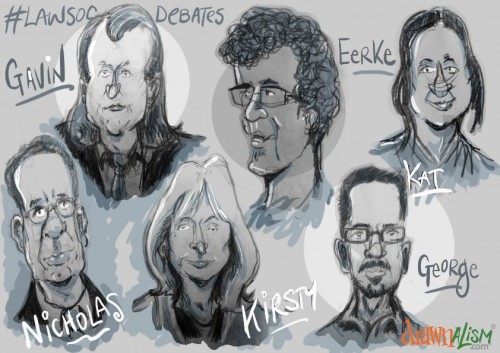The State and Surveillance
Drawnalism_for_LawSocDebates_Crown_State_and_Surveillance_©_Drawnalism_Ltd
A Law Society Public Debate on State Surveillance and Public Scrutiny of the Security Services, 5 March 2014.
As the British political establishment (gradually) wakes up to the scale of electronic surveillance by domestic and overseas intelligence services, a public debate in one of the grander rooms of the Law Society examined the implications.
We heard from lawyers, scientists and a journalist. But not (we assume) from those doing the snooping.
Doughty Street Chambers’ Gavin Millar QC opened by remarking that it is alarming that we have depended on whistleblowers to find out about surveillance activity. And we should not accept reassurances that they are only collecting ‘metadata’ - this can be more revealing than actual content of messages.
Kirsty Hughes of Index on Censorship wondered why the topic was only state surveillance, given the amount of information collected by businesses such as Google.
The Miranda judgment was sweeping and very damaging - it directly linked journalism with terrorism, she added.
‘We have to step back from mass surveillance. We need full judicial and political scrutiny.’
Drawnalism_The_State_and_Surveillance_1_sans_©_Drawnalism_Ltd
George Danezis, of the department of computer science, University College London, stressed the issue is broader than that of free speech. The internet promised a better way of running society - now the security services have subverted the technology, we can no longer trust it.
But he assured us the technology exists to prevent surveillance - if only users would demand it; it is a case of market failure.
More alarming words came from another boffin, Eerke Boiten, of the University of Kent - we are being fooled by a false distinction between collection and surveillance, he argued. ‘We talk about needles in haystacks. But mass state surveillance creates the haystack in which to find the needle. Can this really prevent terrorism?’
In the legal corner, Reprieve's legal director, Kat Craig, touched on an issue of direct concern to the Law Society - the apparent extrajudicial killing of clients located by interception of communications with lawyers.
‘The only body that is capable of monitoring MI5, MI6 and GCHQ is un-acountable. It all comes back to the judiciary - no one else has the authority to hold security service to account.’
It has taken UK politicians nine months since the Snowden revelations to take this seriously. But the response is to appoint the Royal United Services Institute to investigate. ‘You can’t get more Whitehall than RUSI!’
Drawnalism_The_State_and_Surveillance_2_sans_©_Drawnalism_Ltd
The point of consensus was that surveillance and the security services are out of control, with a chilling effect on free speech, the rule of law - and perhaps on the use of the internet itself. Perhaps we are heading towards the end of the universal web, with the internet breaking in to islands subject to national or supranational control.
There was less agreement over how we got here. The lawyers tended to depict the legislative framework, especially the Regulation of Investigatory Powers Act, as obsolete and need of overhaul - drafted in a pre-smartphone age.
RIPA’s kafka-esque spawn, the Investigatory Powers Tribunal, came in for particular criticism in its role as the unaccountable forum for all complaints about state snooping.
The scientists were less sure that we got here by accident, pointing out that RIPA was drafted at the height of the dot com boom, when awareness of the potential of the web was extremely strong, and that its architects knew exactly what they were doing.
And the big question from the floor: what will it take for the British public and their representatives to wake up, like their counterparts in Brazil or Germany? The water is getting hotter, but we the frogs were still sitting relatively comfortably.
Drawnalism_Faces_from_#LawSocDebates_05_03_14_©_Drawnalism–Ltd
A mixture of Drawnalism® In-the-Moment and Illustration was used in combination with a journalist to cover this event. You can find out about booking the services here.




